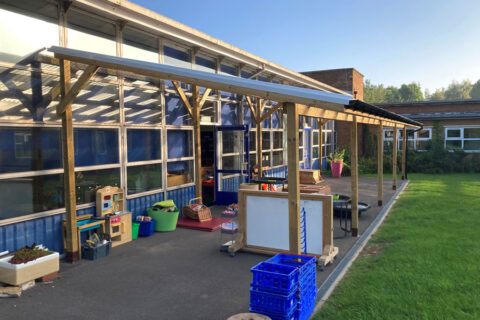Children at Little Stoke Primary School were thrilled to appear on national TV at the beginning of October in a “back to nature” feature filmed at their on-site Forest School. The BBC visited the school as part of a report on a recent survey of 1,000 families which showed that hardly anyone can correctly recognise the five most common trees in the country (oak, birch, beech, horse chestnut and ash).
In the feature, which was shown on the local BBC Points West and the national CBBC Newsround programmes, children from Years 1 & 2 were shown learning about the different types of trees, plants and flowers that can be found within the school grounds, and how to tell them apart.
Steve Callow, director of Conquer the Woods, a Bath based business that provides Forest School lessons at Little Stoke, told the BBC he feels that children these days “spend too much time on electronics and not enough time outdoors”.
The children were shown taking part in a ‘treasure hunt’ in which they searched for leaves similar to those shown on an annotated worksheet, thereby helping them learn the names of the corresponding trees.
Other activities to have taken place recently include rope challenges, mud kitchen, using tools, making catapults, whittling sticks and picking apples & blackberries and making cake with them on a wood fire.
Pupils begin Forest School lessons at an early age – even the Reception children use the facilities and older pupils spend three hours a week in the outdoor learning environment over two six-week blocks each year.
The children go out in all weathers, with the school providing wet weather clothing and waterproof cameras, and there are tentative plans to provide pupils with rucksacks emblazoned with the school logo, to carry their equipment in.
Headteacher Scott Howes says Forest School sessions have become an important part of the curriculum at Little Stoke in recent years.
“We do place a great emphasis on children learning with all their senses and they have a perfect opportunity to do this during Forest School. It enables us to challenge children to problem solve, work with a range of social groups, become skilled at new things, experience wonder at our natural world, reinforce classroom based learning, develop coordination, have fun, ask new questions and trigger new interests.”
“Most of our children are able to manage reasonable risks in the Forest School setting and are often more capable and independent than we expect.”
The positive impact of the outdoor sessions is apparent in the answers that parents provided in response to a recent questionnaire:
- “My children love being outside, they always look forward to Forest School and are always talking about it. Now, collecting bugs in our garden seems to be a favourite thing to do!” (Y1 parent)
- “I am very surprised how much information he can remember when it is a ‘hands-on’ session” (Y2 parent)
Parents have recently been invited into the school to experience the Forest School activities for themselves and Little Stoke also has plans to offer sessions to children from other schools in the local area.
The school has used part of its Pupil Premium funding to finance the Forest School initiative. It was also recently awarded a grant of £1,844 by the Ernest Cook Trust, one of the UK’s leading educational charities, to help further develop the activities.
Photos (from top): Pupils toast marshmallows with Steve Callow; Steve on BBC Points West; Pupils hang collected leaves on a line.
Video: What’s the difference between a Birch and an Oak? – featuring Little Stoke Primary School (BBC Newsround)
This article originally appeared in the November 2015 edition of the Bradley Stoke Journal news magazine, delivered FREE, EVERY MONTH, to 9,500 homes in Bradley Stoke, Little Stoke and Stoke Lodge. Phone 01454 300 400 to enquire about advertising or leaflet insertion.






